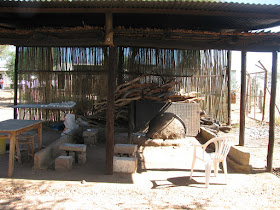We have had visitors the past two weeks. Bruce's sister, Cindy, and her daughter, Molly, her son, Aubrey, and his wife Kimee have been down from Utah. It was wonderful to have family here and see some familiar faces. They spent most of their time here out and about exploring Namibia, but we did end up taking them to Joe's Beer House and Restaurant. This is pretty much a tourist place, but they serve up a wide variety of game and local food. Aubrey and Kimee had game platters that consisted of Springbok, Zebra, Gemsbok, Crocodile, and Onyx, while Cindy went with a sweet potato potjieko (a stew made in a cast iron, three legged pot over and open fire). It was a fun night out.
The kids then went down to Sossusvlei to see the sand dunes. Cindy stayed here with us in Windhoek.
The first day minus kids, we explored the Goreangab dam on the outskirts of Katutura.
It is a very lovely area on its own, but we went to visit Penduka, a organisation that helps rural women all over Namibia to create their own jobs and obtain an income by making and marketing crafts. Penduka means Wake-up! By making crafts, the women can support their families in the villages. Each week, they travel to Penduka to pick up their work and return the finished product the next week. There are also women who work at the site.
They have a large sewing room which in addition to the crafts they sell, takes orders from the surrounding area. The day we were there, they were making laundry bags.
 |
| A Hererro woman at her sewing machine. |
 |
| The women you can barely see in the back of the room where ironing hand embroiderd labels for all the crafts. |
Penduka has groups of women doing embroidery in Katutara, on farms and in the areas around Otijwarongo. The women embroider stories about life in the village, their childhood, farming and anything that interests them. As well as being hand-done, each work in unique.
They also make glass beads from recycled glass bottles. This department was started especially
for hearing impaired women. They break the glass in small pieces, put the splinters in a casting mold and melt it in a home-made clay oven. While the bead is still hot, they make the holes, let it then cool down, sand and polish the beads before creating necklaces and jewelry.
 |
| The clay oven |
 |
| Molds for the beads |
 |
| Bottles waiting to be crushed |
 |
Women string the beads. The woman in the center was also embroidering on bicycle inner tubes to make beads. It was super cool way to recycle and you would never in a million years be able to guess what they were made of.
 |
| Some of the finished work. |
Penduka also makes pottery using both clay molds and a potter's wheel.
Another interesting craft is batik. The designs are painted on cloth using cake flour paste which is allowed to dry in the sun. They are then painted by hand. The removal of the dried paste forms the design. They had some beautiful work.
 |
Here is the light table where the batik patterns are traced onto material. The pile on the side have been traced with the flour paste and are waiting to be color painted.
They also had a couple of examples of traditional village homes and an exhibit of making bottle houses.
|
They use wine bottles for the foundation and beer bottles for the walls. Two of the windows were made from the door of a washing machine. Penduka is teaching how to use the available materials when there are few resources. I can certainly see how a bottle house would better than the corrugated tin sheds.
The San women that embroider Penduka products also run a restaurant. They grow their own tomatoes, spinach, mushrooms and peppers. They also have a small chicken farm for eggs. We are a very good lunch consisting of traditional foods: Chicken with spinach and peanut butter, Mopane worms with pap, Chakalaka with rice, and Bobotie with yellow rice.
 |
| Chakalaka is in the large bowl. It is basically a spicy curry vegetable dish. Pap is in the small bowl. |
 |
You eat the Mopane with a bite of pap (corn mush). They were pretty good.
|
I was very impressed with this organization. They were taking the limited resources available to the poor and creating jobs and income. Penduka was established in 1992, so it is obliviously successful. Not only do they extend a helping hand to women with few opportunities of their own, the quality of the work was excellent. By making these crafts, the women can show their pride in their culture and support their families in the villages.
|

















Amazing! I am really enjoying your posts, Karen - but I have to confess, that I'd struggle with the worms. Still, I am fascinated by all the interesting experiences that you are having. Love and think of you ALL THE TIME!!! :)
ReplyDelete